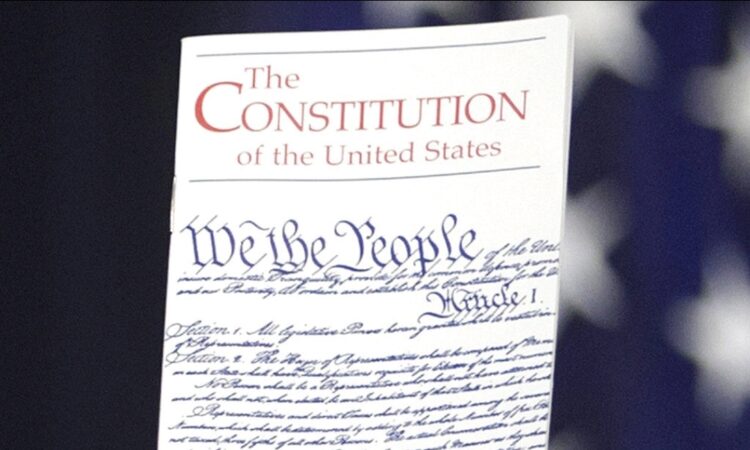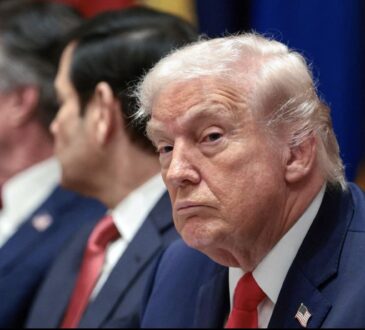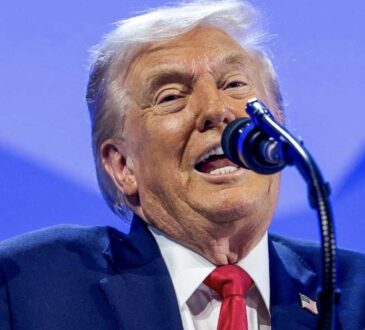
In March 2016, a photographer captured an image of a member of Congress holding the Constitution at Capitol Hill in Washington, a reminder of the nation’s core legal foundation. Years later, President Donald Trump made headlines by declaring that he wanted to end the right to automatic citizenship for children born in the United States to non-citizens or undocumented immigrants. This right, known as birthright citizenship, has been guaranteed since the passage of the 14th Amendment, and Trump’s suggestion that he could take it away by executive action raised immediate questions about the limits of presidential power.
Over the coming months, the Supreme Court is expected to face questions about Trump’s use of power in several areas. The Court may reject his unilateral use of tariffs, which bypassed Congress, or his attempt to block birthright citizenship. These cases are more than just legal disputes; they test how far a president can stretch the boundaries of his office. Many experts believe that the justices will likely push back and limit Trump’s claims of authority.
Still, a larger question hovers over these possible rulings. What if Trump simply ignores the Court? Some political analysts, and even officials in his own administration, have admitted in private that they worry about this possibility. The concern is not just about one ruling, but about what it would mean for the rule of law in America if a sitting president were to defy the Supreme Court outright. The U.S. system is built on checks and balances, and the idea that no one is above the law. A president openly rejecting a Court order would strike at the very core of that system.
It may be tempting to assume Trump could get away with this, but history suggests otherwise. The risks and costs of ignoring the Court would likely be far greater than Trump or his supporters imagine. If the justices issued a firm ruling, especially one with overwhelming support — such as a unanimous decision or a strong majority like 7–2 — it would carry the moral and legal force of the Constitution itself. This kind of decision has been powerful in the past. In 1974, the Supreme Court unanimously ordered President Richard Nixon to turn over the Watergate tapes. Nixon initially resisted, but the ruling left him with no political room to maneuver. His own party abandoned him, and within weeks, he resigned. A similar unified rebuke could isolate Trump, even among his allies.
The weight of a Supreme Court ruling would be even greater if it came in response to an action that blatantly contradicted the Constitution, such as rejecting the 14th Amendment’s guarantee of citizenship to anyone born on U.S. soil. In such a case, the Court would not just be disagreeing with Trump on policy; it would be affirming the very foundation of American law. Timing would also play a role. The Court can decide when to release its rulings, and if it issued one during a politically sensitive period, such as before the 2026 elections, it could intensify the pressure on Trump. If Republican lawmakers were already struggling to keep their seats in a difficult election cycle, they might feel forced to distance themselves from him. Some might even go public, saying, “The president is wrong,” in order to protect their own political futures.
Trump has long assumed he can bend institutions to his will, but that assumption is not always accurate. For example, he successfully ordered his administration to cancel most USAID programs, a move that was extreme but logistically simple. Yet he does not hold the same sway over the Federal Reserve. The Fed is designed to be independent, operating through its twelve regional banks and funded by its own activities rather than congressional budgets. This means Trump cannot threaten its funding as he does with other agencies. He has tried to pressure the Fed on interest rates and even floated the idea of replacing governors with loyalists, but such moves face deep legal and institutional barriers. If the Supreme Court ruled against him in this area, he would have very few options to push back.
Another complication for Trump is how the broader judicial system would respond. Normally, federal courts give the executive branch some leeway, often siding with or deferring to presidential authority. But if Trump openly defied the Supreme Court, that trust would likely evaporate. Judges around the country could begin ruling against his administration in other cases, compounding his problems. In this sense, ignoring one ruling could unleash a chain reaction of setbacks across the courts.
Even if Trump decided to ignore the Court, he could not act alone. He would depend on the people within his administration to carry out his orders. This would put those officials in an extraordinarily difficult position. On one hand, they would face pressure to remain loyal to the president, who controls their careers in the short term. On the other hand, they would face the long-term judgment of history and the possibility of legal consequences for disobeying the Supreme Court. Many senior officials resigned during Trump’s first term when they felt he crossed ethical or legal boundaries, and it is likely that a constitutional crisis of this magnitude would provoke even greater resistance from within.
The consequences of Trump defying the Court would also reach far beyond Washington. The American political system is closely tied to global financial markets and international trust. Investors and world leaders rely on the idea that the United States is a stable nation governed by laws, not by the whims of one individual. If Trump were to reject a Supreme Court ruling, it would call that assumption into question. Such a move could spark a constitutional crisis, shake confidence in the dollar, and trigger steep declines in the stock market. We have already seen how markets react to uncertainty: in April 2025, tariffs led to a sharp sell-off that erased 10 percent of market value in just two days. A direct challenge to the rule of law could cause even deeper damage, both economically and diplomatically.
For all these reasons, Trump’s threats to defy the Court should not be taken as a certainty. The stakes are simply too high. To reject the authority of the Supreme Court would not only destabilize the country but could also destroy Trump’s own political future. Even if he were willing to risk chaos, he would have to reckon with the fact that his own party, the courts, his administration, and the global community might all turn against him. In the end, the costs of ignoring the Court’s authority could be so overwhelming that they bring about his downfall, reminding the world once again that no president, no matter how powerful, is above the Constitution.




